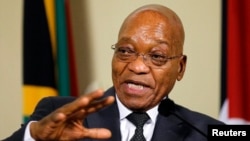Social media networks in South Africa heated up when the nation’s president sent out a Twitter call for suggestions for this week's State of the Nation Address. He was flooded with constructive and snide remarks - a sign that many in this nation will be hanging on his every word come February 12.
Everyone agrees South Africa has many major issues. Among them: High rates of violent crime; the world’s largest burden of HIV and AIDS; the under performing education system; the nation's dangerously decrepit and ailing electricity grid, which has forced the energy utility to organize rolling blackouts, and as always the economy.
President Jacob Zuma will likely reference all of these important subjects in Thursday's annual speech before Parliament.
But when he took to Twitter earlier this month to ask his citizenry what they think he should talk about during this year's State of the Nation address, they raised the thing the president really doesn't want to talk about: a growing scandal that he just cannot seem to escape and the increasingly loud demands that he quit.
Those clouds of scandal have hung over Zuma for nearly six years, when local journalists first reported he allegedly spent millions of dollars in public funds on upgrades to his rural homestead, Nkandla. Since that first report in 2009, the issue, and the project’s costs, have snowballed to nearly $20 million. (Note the exchange rate has radically changed since the Nkandla story broke.)
This topic has taken on a life of its own, eclipsing other discussions, even disrupting sessions of parliament, and making this year’s speech the most hotly anticipated State of the Nation address in years.
The nation's newest opposition force, the far-left Economic Freedom Fighters party, has promised to disrupt the speech to reiterate their now famous slogan that Zuma "pay back the money" from his renovations. Party head Julius Malema has even gone so far as to threaten to show up at the speech naked as a form of protest.
The Twitterverse is digitally salivating over this possibility, as seen by this comment from user Suta Kavari .
"Let's be honest about #SONA2015, I'm not here for Zuma. All I want is drama, but on the same level as #PayBackTheMoney. The EFF has one job."
He's not the only one looking for drama, said user Sir Kgauza.
"Looking forward to seeing Pres. Zuma addressing the nation & then resigning." "#DayDreaming"
And a short and pointed request from user Mava Martins: "please resign and payback the money."
Other contributors took the president's question a bit more seriously, like the customarily dry and diplomatic U.S. Embassy in South Africa.
"We’re hoping to see @PresidencyZA announce policies that will help attract [international] investment, generate jobs and spur trade ..."
Or well-known activist and labor organizer Jay Naidoo, who served in the late president Nelson Mandela's Cabinet, "We have a critical crisis on our energy grid. Will our President acknowledge & declare an energy national emergency?"
But in a nation riven with serious problems like unemployment, which stands at more than 25 percent, and widening inequality, some South African Tweeters say the president's speech is just, well, talk.
"What challenges do you want President Zuma to address during the #SoNA2015 asked user @Mthetheleli15, Does it matter?"
Or this cynical response from user Langa, "I live in the shacks, survive on government grants. Do you honestly believe #PayBackTheMoney chants will impress nor change my situation?"
Tweets for thought, indeed.




